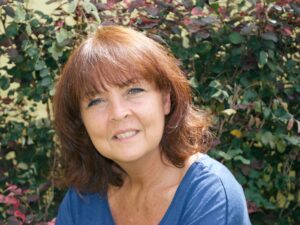2022 Distinguished Scholar Lecture
This year's Distinguished Scholar is Rahna Reiko Rizzuto.
The lecture is hosted by Professor Katsuya Izumi and the Japanese Section of Language and Culture Studies.
Click here to view the lecture
Rahna Reiko Rizzuto, Author
Hosted by: Katsuya Izumi, Japanese Section
Rubble and Remembrance:
Trauma Narratives and Healing On and Off the Page
2022 marks the 80th anniversary of the incarceration of the Japanese Americans during World War II, an event that would change Rahna Reiko Rizzuto’s life, though she would not be born until decades later. Rizzuto grew up not knowing that her mother spent her first years of life as a prisoner of her own government in a pop-up camp in the Colorado desert, and once she learned the truth, the camp had been reduced to a makeshift graveyard and some concrete barracks footprints. Her quest to understand her family’s experience and the silences that surrounded it grew into three books, and took her to Hiroshima, Japan, where she was interviewing the survivors of the first atomic bomb used on civilians when the 9/11 terrorist attacks unfolded before her Brooklyn-based family’s eyes.
At Trinity, Rizzuto will discuss her experiences chasing lost histories and missing memories, and her intentions, as a writer, to construct her narratives to depict and mimic trauma. Her two novels and memoir all rely on multiple voices, breaks in the timeline, and secrets that are never revealed, which she uses to build a composite truth more potent than any single narrative. She notes that her topics, and the historical and political settings of her stories, have been deliberately ignored or reshaped, a silencing that she confronts by writing their effects on the bodies and psyches of her characters.
The stories we tell about who we are – and who we are not – are central to Rizzuto’s writing. She observes the necessity of forgetting, both for healing and also for creating the separation that leads to racism, nationalism, sexism and other forms of privilege and hate. She explores this through her personal life as well as her creative work, as she reflects on how her own experiences and the experiences of her characters began to echo each other. Learning from history relies as much on empathy as on reporting, in her view, and it is therefore important to her to depict and convey traumatic memories through powerful storytelling, especially as we lose first-hand accounts.
Bio:
Rahna Reiko Rizzuto’s three books include Shadow Child, a mystery/family/saga/historical novel set in Hawaii, New York and Japan; her memoir, Hiroshima in the Morning, which moves from the original “Ground Zero” to its echo, the 9/11 terrorist attacks; and her first novel, Why She Left Us, about the Japanese American incarceration camps. Her awards and recognitions include an American Book
Award, Grub Street National Book Award, National Book Critics Circle Finalist, Asian American Literary Award Finalist, Dayton Literary Peace Prize Nominee, among others. She is also a recipient of the U.S./Japan Creative Artist Fellowship, funded by the National Endowment for the Arts. She was Associate Editor of The NuyorAsian Anthology: Asian American Writings About New York City. She has been interviewed widely on motherhood including on The Today Show, 20/20, and The View. Reiko’s articles on motherhood, Hiroshima, the Japanese incarceration camps and radiation poisoning have been published globally, including in the L.A. Times, Guardian UK, CNN Opinion, and Salon, and through the Progressive Media Project and The Huffington Post, and have been anthologized in Mothers Who Think, Because I Said So, and Topography of War, among others. She was on the faculty of the Goddard College MFA in Creative Writing for 17 years. Reiko teaches in university and retreat settings, including for Hedgebrook, and through the Two Trees Writers Collaborative. She is “hapa” (mixed Japanese/Caucasian), was the first woman to graduate from Columbia College with a degree in Astrophysics, and was born and raised in Hawaii. Her website is www.rahnareikorizzuto.com.

